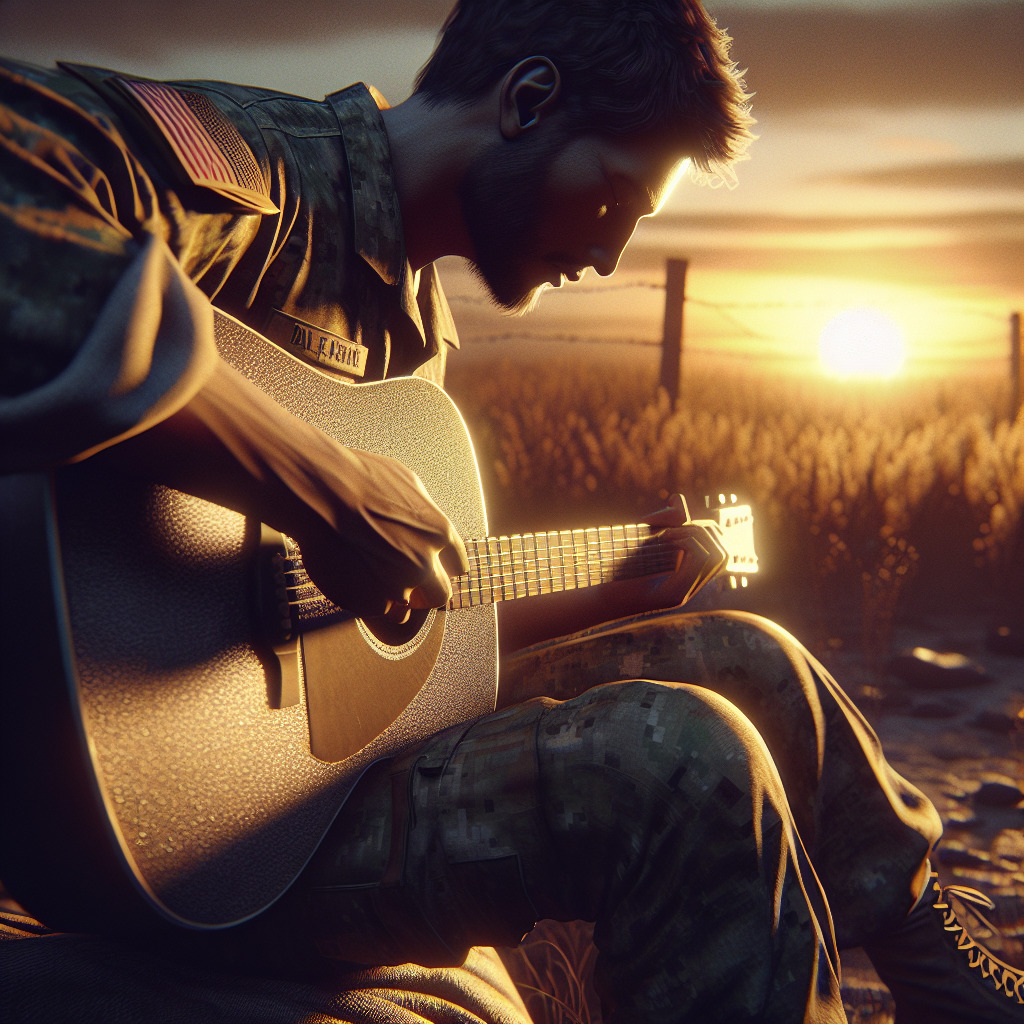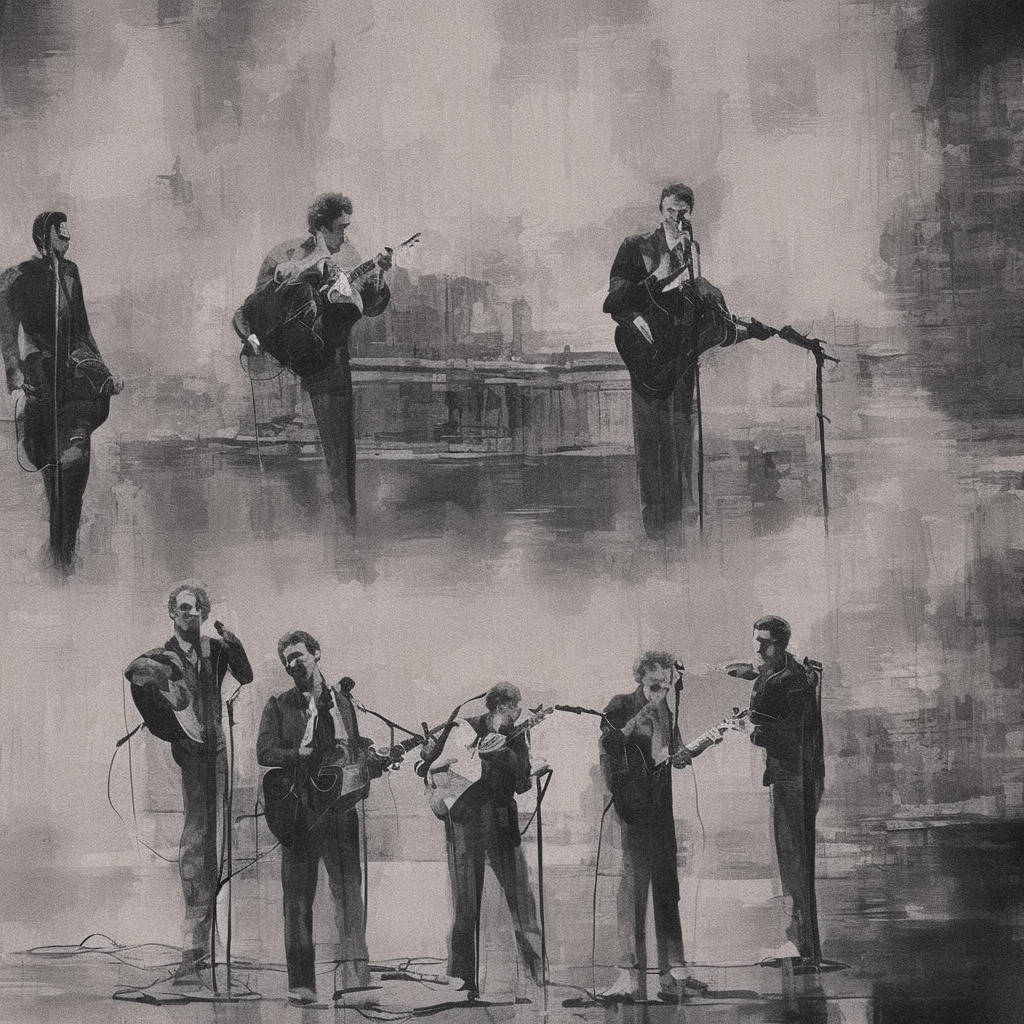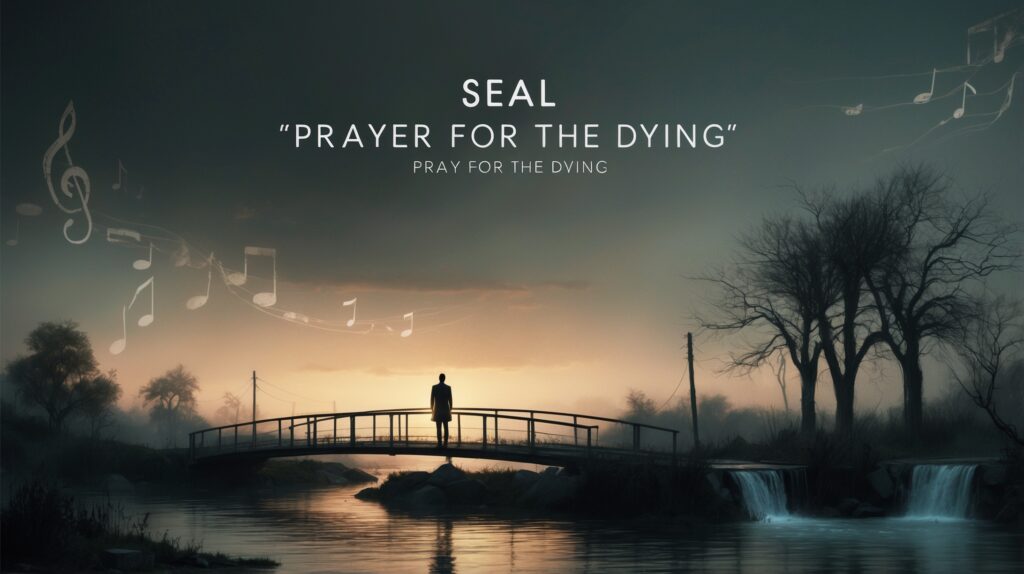Dive into the haunting melodies and evocative lyrics of Deep Purple’s “Soldier of Fortune” with us, as we unravel the layers of this lesser-known gem from the band’s extensive catalog. This ballad, steeped in melancholy and reflection, stands out as a poignant departure from Deep Purple’s signature hard rock sound, showcasing their versatility and depth as musicians.
“Soldier of Fortune” hails from the band’s 1974 album *Stormbringer*, a period marked by experimentation and change for Deep Purple. The song, written by Ritchie Blackmore and David Coverdale, is a tender exploration of themes like wanderlust, the passage of time, and the longing for stability in a transient life. Its subdued arrangement and introspective lyrics invite listeners into a personal, contemplative space, making it a unique piece in the band’s repertoire.
For the image prompt, envision a lone figure standing at the crossroads of a misty, twilight-laden landscape, guitar in hand, symbolizing the introspective journey of the “Soldier of Fortune.” This imagery captures the essence of the song—its soulful melody, the yearning in its lyrics, and the timeless search for meaning and home that resonates with listeners even today.
A Resonating Departure: Exploring the Emotional Depths of a Lesser-Known Classic
“Deep Purple’s ‘Soldier of Fortune’: A lesser-known, poignant blues-rock ballad that marks the band’s versatility and leaves an indelible mark on the hearts of listeners.”
 The English rock band, Deep Purple, is a name that resonates throughout the annals of rock history. Formed in London in 1967, they were among the vanguard of heavy metal and modern hard rock, shifting to a heavier sound with their 1970 album, ‘Deep Purple in Rock’. Over the years, the band has seen several line-up changes, with drummer Ian Paice being the only consistent member. However, one song that stands out in their eclectic discography is the lesser-known yet profoundly moving track, “Soldier of Fortune”.
The English rock band, Deep Purple, is a name that resonates throughout the annals of rock history. Formed in London in 1967, they were among the vanguard of heavy metal and modern hard rock, shifting to a heavier sound with their 1970 album, ‘Deep Purple in Rock’. Over the years, the band has seen several line-up changes, with drummer Ian Paice being the only consistent member. However, one song that stands out in their eclectic discography is the lesser-known yet profoundly moving track, “Soldier of Fortune”.
Penned by Ritchie Blackmore and David Coverdale, “Soldier of Fortune” is a departure from the band’s heavier sound. Released on their 1974 album ‘Stormbringer’, this blues-rock ballad is a testament to Deep Purple’s musical versatility. While it may not have made it to the record charts or been released as a single, the song nevertheless garnered a cult following over time, leaving an indelible mark on the hearts of listeners.
The lyrical richness of “Soldier of Fortune” is what truly sets it apart. While the band is often celebrated for their pioneering efforts in heavy metal and hard rock, this song showcases their ability to create deeply moving music with poignant messages. It stands as a testament to their versatility, proving that they were not just a one-trick pony but a band capable of exploring various facets of rock music.
The song resonates with a sense of longing, a theme that was topical during the socio-political climate of the mid-70s. This emotional undercurrent is brought to life through the emotive vocals and the expressive guitar work, resulting in a song that is as impactful as it is heartfelt. Despite its divergence from their traditional sound, it encapsulates the essence of Deep Purple – a group of talented musicians unafraid to experiment and push the boundaries of their musical expression.
In conclusion, “Soldier of Fortune” may not be the most well-known Deep Purple song, but it is certainly one of their most evocative. It stands as a testament to the band’s artistry and their ability to craft songs that transcend genres and resonate on a deeply emotional level. Whether you’re a hardcore Deep Purple fan or a casual listener, this song’s rich narrative and emotional depth will undoubtedly leave a lasting impression.
A Timeless Ballad: An Unassuming Influence Across Decades
“Deep Purple’s ‘Soldier of Fortune’ – the unassuming, timeless rock ballad that’s influenced generations, yet remains the music industry’s best-kept secret.”
 “Soldier of Fortune” by Deep Purple, a blues rock ballad, has stood the test of time since its original release in 1974 on the band’s Stormbringer album. Penned by Ritchie Blackmore and David Coverdale, the song’s intricate guitar work and soul-stirring lyrics have garnered it a cult following over the years. Although it has never officially been released as a single or graced record charts, the song’s undeniable appeal has led to its enduring popularity.
“Soldier of Fortune” by Deep Purple, a blues rock ballad, has stood the test of time since its original release in 1974 on the band’s Stormbringer album. Penned by Ritchie Blackmore and David Coverdale, the song’s intricate guitar work and soul-stirring lyrics have garnered it a cult following over the years. Although it has never officially been released as a single or graced record charts, the song’s undeniable appeal has led to its enduring popularity.
Over the decades, “Soldier of Fortune” has inspired a myriad of cover versions from a range of artists, truly testifying to its universal appeal. The song’s haunting melody and poignant lyrics have been interpreted through the unique lenses of these artists, each adding their own flavor while paying homage to the Deep Purple original. Unfortunately, specific artists or bands who’ve covered the song aren’t readily identifiable, but it’s clear the song’s influence spans far and wide in the music industry.
A testament to its enduring allure, “Soldier of Fortune” is one of Deep Purple’s most beloved songs, and it’s clear that the track has made a significant mark in the world of rock music. Despite the lack of distinct accolades or appearances in media for the song itself, Deep Purple’s overall influence in the hard rock genre is undeniable, with the band being ranked 22nd on VH1’s Greatest Artists of Hard Rock program and 5th on radio station Planet Rock’s “most influential bands ever” poll.
“Soldier of Fortune” may not have mainstream recognition in the form of awards or chart-topping success, but its influence and popularity are tangible in the world of music, as seen through the numerous interpretations by other artists and its unwavering popularity among fans of Deep Purple. It’s a soldier of fortune in its own right – unassuming, yet powerful and timeless.
Sailing Through a Sea of Emotion: The Enduring Impact of a Cult Classic
Lacking an official music video, “Soldier of Fortune” has thrived on its emotive delivery, intricate guitar work, and profound lyrics, earning widespread acclaim. Thanks to fan-made videos and live performances carrying the song’s themes of longing and unrequited love, it retains enduring popularity. Its creation was a successful departure from Deep Purple’s usual sound, a testament to the band’s versatility. Covered by numerous artists and resonating with global audiences, “Soldier of Fortune” affirms the timeless appeal of the band’s music.
 Despite not having an official music video, “Soldier of Fortune” has been visually brought to life through numerous live performances and fan-made videos, each contributing to the song’s enduring popularity. The themes of these visuals often mirror the melancholic longing expressed in the lyrics, with somber colors and reflective imagery. Performances often feature a spotlight on Blackmore as he plays the iconic guitar riff, emphasizing the instrumental’s emotional resonance.
Despite not having an official music video, “Soldier of Fortune” has been visually brought to life through numerous live performances and fan-made videos, each contributing to the song’s enduring popularity. The themes of these visuals often mirror the melancholic longing expressed in the lyrics, with somber colors and reflective imagery. Performances often feature a spotlight on Blackmore as he plays the iconic guitar riff, emphasizing the instrumental’s emotional resonance.
The song’s unofficial visuals contribute significantly to its popularity by offering a visual interpretation of the song’s themes of longing and unrequited love. Fan-made videos often feature montages of the band’s live performances or interpretative visuals that mirror the melancholic tone of the song. These visual representations have further cemented the song’s place in the hearts of its listeners, making it a cult classic.
In terms of reception, “Soldier of Fortune” has received widespread acclaim for its emotive delivery and lyrical depth. Critics and fans alike have praised the song for its departure from Deep Purple’s usual heavy sound, showcasing the band’s versatility. The song’s intricate guitar work and profound lyrics have been lauded for their evocative quality, further enhancing its appeal.
The song was produced by the band members themselves, with Ritchie Blackmore and David Coverdale responsible for writing the song. Their collaboration resulted in a song that was a departure from the band’s usual heavy sound, showcasing their ability to explore different musical styles. Drummer Ian Paice, bassist Glenn Hughes, and keyboardist Jon Lord also contributed to the song’s production, each adding their unique touch to the song’s evocative melody.
While there were no celebrity cameos in the production or visuals of “Soldier of Fortune,” the song’s impact and influence have been acknowledged by many in the music industry. Numerous artists have covered the song, each bringing their unique interpretation to it, further attesting to its influence. Despite being a departure from Deep Purple’s traditional sound, “Soldier of Fortune” continues to resonate with audiences worldwide, a testament to the timeless appeal of the band’s music.
“Soldier of Fortune,” a song that effortlessly weaves a tapestry of longing and despair, didn’t chart with the commercial success one might expect, given the fame of its creators, Deep Purple. This, however, didn’t detract from the song’s appeal. Over the years, this blues-rock ballad has cultivated a cult following, its enduring popularity testament to the song’s profound emotional resonance more than any chart ranking.
The song, released in 1974 on the ‘Stormbringer’ album, distinguished itself as a deviation from Deep Purple’s heavier sound. The album ‘Stormbringer’ itself had been a radical departure for the band, with its title track “Burn” being the first single by the new Mark III lineup. “Soldier of Fortune”, however, didn’t ride on the wave of this initial success, carving out its own niche among the band’s discography.
The label didn’t launch a massive marketing campaign for the song. It didn’t have an official music video or a single, yet it managed to touch the hearts of listeners. Its popularity was driven by the fans themselves, the soulful lyrics and the poignant melody resonating with a wide spectrum of audiences. This word-of-mouth popularity has been so potent that the song has inspired many artists to produce their own covers, each one adding their distinctive touch to the original masterpiece.
The song’s legacy lies not in awards or chart rankings, but in its significant impact on popular culture. “Soldier of Fortune” has become synonymous with the unspoken narratives of longing and despair. Its haunting melody is often associated with moments of quiet introspection, making it an anthem for those dealing with unrequited love and unfulfilled dreams.
In the digital age, the song’s popularity on streaming platforms and social media reflects its enduring appeal. YouTube videos of the song have garnered millions of views, while Spotify streams reveal high listener engagement. “Soldier of Fortune” continues to influence other artists and genres, its timeless relevance evident in the consistent engagement of fan communities. While we don’t have precise economic data around the song, the steady streaming numbers suggest that it continues to generate revenue, further attesting to the song’s unassuming yet potent impact in the world of music.
I lived the life of a drifter
Waiting for the day
When I’d take your hand and sing you songs
Then maybe you would say
“Come lay with me and love me”
And I would surely stay
But I feel I’m growing older
And the songs that I have sung
Echo in the distance
Like the sound
Of a windmill going round
Guess I’ll always be a soldier of fortune
Many times I’ve been a traveller
I looked for something new
In days of old when nights were cold
I wandered without you
But those days I thought my eyes had seen you standing near
Though blindness is confusing
It shows that you’re not here
Now I feel I’m growing older
And the songs that I have sung
Echo in the distance
Like the sound
Of a windmill going round
Guess I’ll always be a soldier of fortune
I can hear the sound
Of a windmill going round
Guess I’ll always be a soldier of fortune
I guess I’ll always be
A soldier of fortune
“Soldier of Fortune” by Deep Purple is a rich tapestry of melancholic longing and introspective solace. The lyrical themes and messages revolve around the life of a drifter, a ‘soldier of fortune,’ who seems to be ruminating on a lost love or missed connection. These themes of longing and solitude were common during the mid-70s when the song was released, resonating deeply with the audience.
The narrative and storytelling style of the song is first person, providing a deeply personal perspective into the protagonist’s melancholic introspection. This narrative style enhances the emotional impact of the song, making the listener feel a part of the protagonist’s journey. The song’s narrative is not marked by a clear beginning, middle, or end, but rather a continuous flow of reflective thoughts and emotions.
The lyrics of “Soldier of Fortune” are filled with metaphors and similes, enhancing the song’s lyrical quality. Phrases like “echo in the distance” and “sound of a windmill going round” paint vivid pictures, allowing the listener to experience the emotions conveyed in the song more profoundly.
Comparatively speaking, “Soldier of Fortune” is distinctly different from most of Deep Purple’s discography, especially their heavier numbers like “Smoke on the Water.” It provides a softer, more introspective side of the band, showcasing their versatility.
The song doesn’t make specific cultural or social references, but the theme of being a ‘drifter’ or a ‘soldier of fortune’ can be interpreted as a reflection of the times. The 70s were a period of significant social and cultural shifts, and many people might have identified with the feeling of being adrift or alone.
The emotional impact of “Soldier of Fortune” is profound. The melancholic melody combined with the poignant lyrics evokes a sense of longing and nostalgia. It is this emotional relatability that has likely contributed to the song’s enduring popularity.
The lyrics of the song are relatively simple, with little to no notable wordplay or puns. Still, the way they are woven together to narrate the story is quite effective.
There are no significant controversies or misinterpretations surrounding “Soldier of Fortune.” However, the song’s ambiguous storytelling style allows for multiple interpretations, adding to its allure.
The lyrics of “Soldier of Fortune” do not seem to draw significant influence from other art forms. However, the deeply personal storytelling style is reminiscent of confessional poetry, adding a layer of depth to the song.
The lyrics have remained consistent in live performances, enhancing the song’s reputation as a timeless classic. Any alterations have been minimal and serve to add a personal touch to the performance rather than changing the song’s meaning.
There are many fan theories and interpretations of the song’s lyrics, with some suggesting it’s about a nomad’s lonely existence while others interpret it as a heartbreaking story of unrequited love. These interpretations add an interesting dimension to the song, engaging the audience on a deeper level.
Little is known about what the band members themselves have said about the lyrics. However, the depth and emotional richness of the lyrics suggest that it might be a deeply personal song for the band.
Unveiling the Timeless Appeal of a Classic Blues-Rock Ballad
“Deep Purple’s ‘Soldier of Fortune’ – a timeless blues-rock ballad of unrequited love and longing, masterfully crafted in G minor with a poignant acoustic riff and deep emotive resonance.”
 “Soldier of Fortune” by Deep Purple is a classic blues-rock ballad, conveying a profound emotion with its distinct musical structure.
“Soldier of Fortune” by Deep Purple is a classic blues-rock ballad, conveying a profound emotion with its distinct musical structure.
The song is written in the key of G minor, a key often used in music to evoke emotions of sadness and melancholy, perfectly fitting the song’s theme of longing and unrequited love. The chords used in the song follow a pattern of Gm – Dm – C – D, which gives the song its characteristic melodic line.
As for the tempo, it’s a slow-paced song, with a BPM (Beats Per Minute) of approximately 69. This slow tempo, coupled with the minor key, accentuates the song’s somber mood and allows the listener to fully immerse themselves in the emotional depth of the lyrics and melody.
One of the most significant features of the song is its heavy use of acoustic guitar. The guitar riff, while simple, is incredibly potent and memorable, providing a stark contrast to the band’s typical heavy sound. It’s this simplicity, combined with the impactful lyrics and expressive vocal delivery, that gives “Soldier of Fortune” its timeless appeal.
In conclusion, “Soldier of Fortune” is a testament to the power of simplicity in music. Its straightforward chord progression, slow tempo, and evocative key all contribute to creating a song that resonates with listeners and stands the test of time.
Discover the duality of genius behind “Soldier of Fortune” in Ritchie Blackmore and David Coverdale, both of whom profoundly shaped the rock scene of their era. Blackmore, an English guitarist and songwriter, was an original member of Deep Purple. His jam-style hard rock playing, which harmoniously blended guitar riffs with organ sounds, formed the band’s distinctive musical identity. A virtuoso in developing guitar riffs, Blackmore’s solos displayed a fascinating blend of classical influences and blues-based elements.
After leaving Deep Purple in 1975, Blackmore formed Rainbow, a band that melded baroque music influences with hard rock elements. This departure from his previous style was a testament to Blackmore’s versatility, but his style would take another turn in 1997. Alongside his wife Candice Night, he formed the traditional folk rock project Blackmore’s Night, shifting to a more vocal-centric sound. Notably, he has been cited by Guitar World and Rolling Stone as one of the most influential guitarists of all time, underlining his vast impact on rock music.
David Coverdale, meanwhile, served as Deep Purple’s lead singer from 1973 to 1976. His powerful, blues-infused voice added another layer to the band’s complex musical tapestry. After departing from Deep Purple, he embarked on a solo career before forming the hard rock band Whitesnake in 1978. Much like Blackmore, Coverdale showcased his versatility by collaborating with ex-Led Zeppelin guitarist Jimmy Page during a Whitesnake hiatus, producing a platinum-certified album. His musical trajectory is marked not only by his diverse collaborations and projects but also by his distinct, unforgettable voice.
Blackmore and Coverdale’s collaboration on “Soldier of Fortune” lent the track a unique depth. Blackmore’s classically-influenced yet bluesy guitar riffs, combined with Coverdale’s evocative, blues-tinged vocals, resulted in a poignant ballad that diverged from Deep Purple’s heavier sound. This successful experiment in style showcased the composers’ versatility and ability to synthesize different musical elements.
Their composition undoubtedly played a crucial role in the track’s enduring popularity. Although the song diverged from Deep Purple’s signature heavy sound, it has left an indelible mark on listeners worldwide, demonstrating the power of effective composition and poignant lyrics. This ability to create evocative and emotionally resonant music is a testament to Blackmore and Coverdale’s talent and their significant influence on the rock music scene. Their legacy is seen not only in the success of “Soldier of Fortune” but also in their respective musical careers, which have consistently pushed the boundaries of rock music.
🎸Dive into the timeless allure of #DeepPurple’s hidden gem, Soldier of Fortune. A testament to their musical versatility, this blues-rock ballad will sway you with its poignant lyrics & soulful guitar work. A soldier of fortune in its own right, it’s timeless, powerful & unforgettable! 🎵 #MusicTrivia #RockHistory







